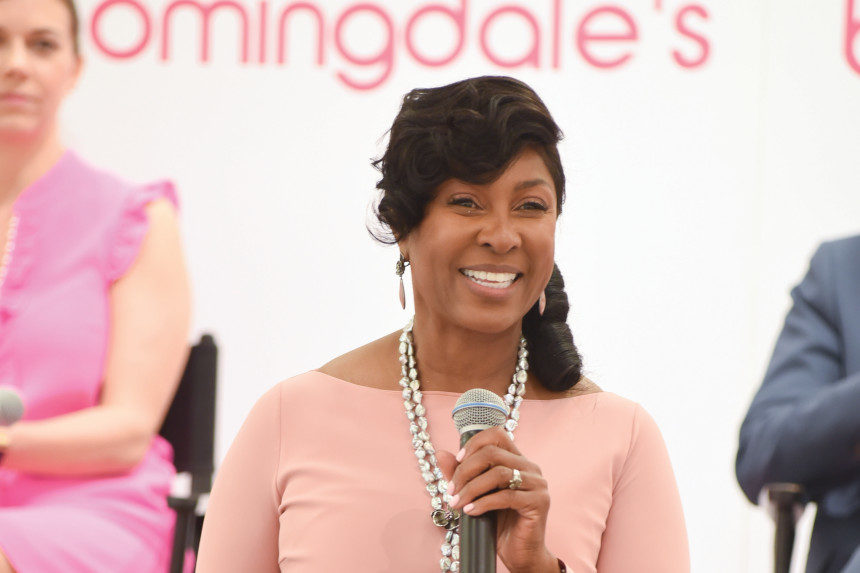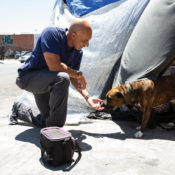Andrea Ivory is the founder and executive director of the Women’s Breast & Heart Initiative (WBHI), a nonprofit based on a simple yet troubling premise: Low-income women face numerous barriers to getting screened for breast cancer and heart disease. They frequently can’t take off work. They may not have a car. Many are trapped in healthcare limbo: They make too much money for public support but not enough to afford health insurance. To surmount those obstacles, Ivory and her roughly 1,000 trained, multilingual volunteers go door to door in at-risk communities, visiting nearly 11,000 households each year and bringing resources directly to them.
The concept changes lives. In Miami Gardens, a woman opened her door, met a WBHI team, and signed up for a mammogram at an upcoming wellness event. Then she made a request.
“Please call my daughter,” the woman said. “She doesn’t have health insurance.”
So they did. The daughter also received a mammogram, which led to a breast cancer diagnosis. Today the daughter is cancer-free.
“We have so many stories like that, where a knock makes a difference,” Ivory says.
Since forming the nonprofit in 2005, Ivory and her volunteer crews have knocked on nearly 140,000 doors. The organization also partners with local healthcare systems and retailers to host hundreds of wellness and screening events, which feature not only mobile mammography vans and screenings for hypertension, glucose, and cholesterol, but sessions on exercise and nutrition. Participants also receive a healthy eating guide and a bag of fresh fruits and vegetables.
“It breaks down every barrier,” Ivory says. “Financial barriers. Transportation barriers. We go on Saturday morning so people are more likely to be off work. And by bringing it to them, it shows that we care. We get hugs at people’s doors.”
Ivory intimately understands the importance of screenings. She’s a breast cancer survivor herself — and her cancer was detected early because of a mammogram.
“My doctor said, ‘You’re the poster child for the benefit of early detection,’ because it gave me choices about treatment,” she says.
The diagnosis at age 45 was a life-altering moment, yet even before the fateful mammogram, Ivory felt adrift. She had a degree in business administration and had built a successful career in real estate. But her life lacked purpose. “I read a lot of books and did a lot of soul-searching because there had to be more to life than selling real estate,” she says. “I had a burning desire to make a difference.
After the mammogram revealed cancer, she sought a second opinion about treatment options at a local hospital. While there, Ivory chatted with women in the waiting room about their own diagnoses. “Some of them explained why they had later-stage diagnoses or why they weren’t going to have the same positive outcomes that I was going to have. And that’s when I realized, if you don’t have health insurance, and you don’t have the knowledge and the education about what to do, then your chance of survivability is affected.”
For Ivory, it was an epiphany. She wanted to provide low-income women with the same opportunities for information and screening that she’d received. And she wanted to go door to door. “Because of my background in real estate, I learned about census tracts and demographics,” she says. “I was able to pinpoint where these women live.”
“I read a lot of books and did a lot of soul-searching because there had to be more to life than selling real estate.”
Interest in the idea was surprisingly strong, as she discovered when she called her first potential partner, Memorial Healthcare System.“I told them about my crazy dream. They had no idea who I was. And they said, ‘Sure, we’d love to help.’
“I literally dropped the phone,” she says with a laugh. “Someone you don’t know calls you and tells you, ‘Yeah, we’re gonna go knock on doors, but we need you to bring out the mobile mammography van.’ And they did. That’s how you know you’re doing what you’re supposed to do.”
To build her door-knocking volunteer army, she first recruited family and friends. One of the first was her friend Maria Elena Abate, an attorney. “So I get this call, and she tells me the concept: You need to go knock on people’s doors and wake them up on Saturday and ask some very personal questions,” says Abate, now a WBHI board member. “And I was like, ‘Are you crazy? Is that gonna work?’ But she had this vision, and it was amazing how it’s transformed people’s lives.”
On their first Saturday in 2006, Ivory and her team visited 100 homes in about 30 minutes. The next time it was 300 homes in an hour. By the end of their first year, they had knocked on roughly 1,800 doors. The following year it was 5,000.
Initially the effort focused strictly on breast cancer. One in eight women will be diagnosed with breast cancer in their lifetimes, and more than 43,000 women die each year. But in 2013, WBHI expanded its focus to include heart disease, which is the number-one cause of death among American women, inflicting 400,000 annual deaths.
Success stories abound. Ivory recalls a woman who was overweight, ate poorly, and hadn’t been screened for breast cancer or heart disease. Then she attended one of WBHI’s screening and wellness days. “When she came to register the following year for her mammogram, nobody recognized her,” Ivory says. “She’d lost weight. She took to heart everything that we shared with her. And she shared that diet and exercise information with her family. That is why we do what we do — because it impacts everyone.”
COVID-19 temporarily stopped Ivory’s door-to-door efforts, though she expects to hit the streets again in 2022. And the organization kept working during the pandemic. Many of its volunteers are college students pursuing careers in healthcare, so WBHI developed a certificate program for breast cancer and heart disease advocacy. The program is offered in 17 colleges and universities in Florida and around the country, including Cornell, George Washington University, Michigan State, and NYU. Nearly 300 students have obtained certifications.
In October 2020, WBHI launched a workplace screening and wellness program with retailers in South Florida, such as Fresco y Más supermarkets. Out of 122 workplace mammograms, medical staff detected breast cancer in three women.
“These women are working every single day — they didn’t have time for screenings or they couldn’t take a day off,” she says. “Also, because of COVID, some women were afraid to go get mammograms. So we broke down all of those barriers.”
Ivory’s next goal is to expand WBHI from a regional to a national organization. She tells the story of a child who wrote her a letter asking her to knock on every door in America so that no one else would die from breast cancer. Abate is among the many supporters who believe she can do it.
“Her capacity to help others is boundless,” Abate says. “She’s always there and always ready to give.” All you have to do is open the door.
Ken Budd is the author of The Voluntourist. His work appears in the 2020 edition of The Best American Travel Writing.
Featured image: Screen saver: After her own diagnosis of breast cancer, Andrea Ivory started a program to help at-risk, low-income women get screened. (Courtesy Andrea Ivory)
This article is featured in the September/October 2021 issue of The Saturday Evening Post. Subscribe to the magazine for more art, inspiring stories, fiction, humor, and features from our archives.
Become a Saturday Evening Post member and enjoy unlimited access. Subscribe now



